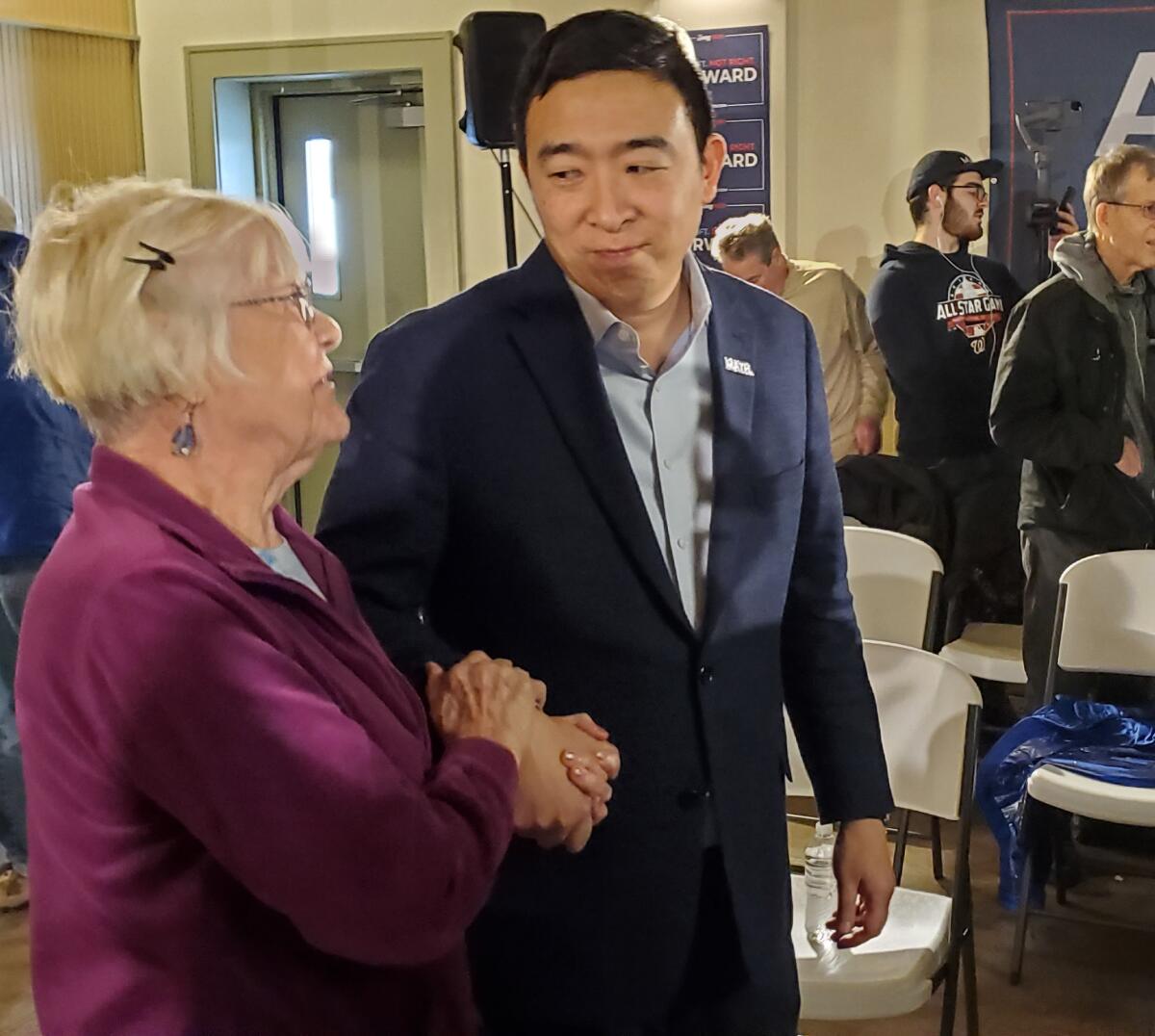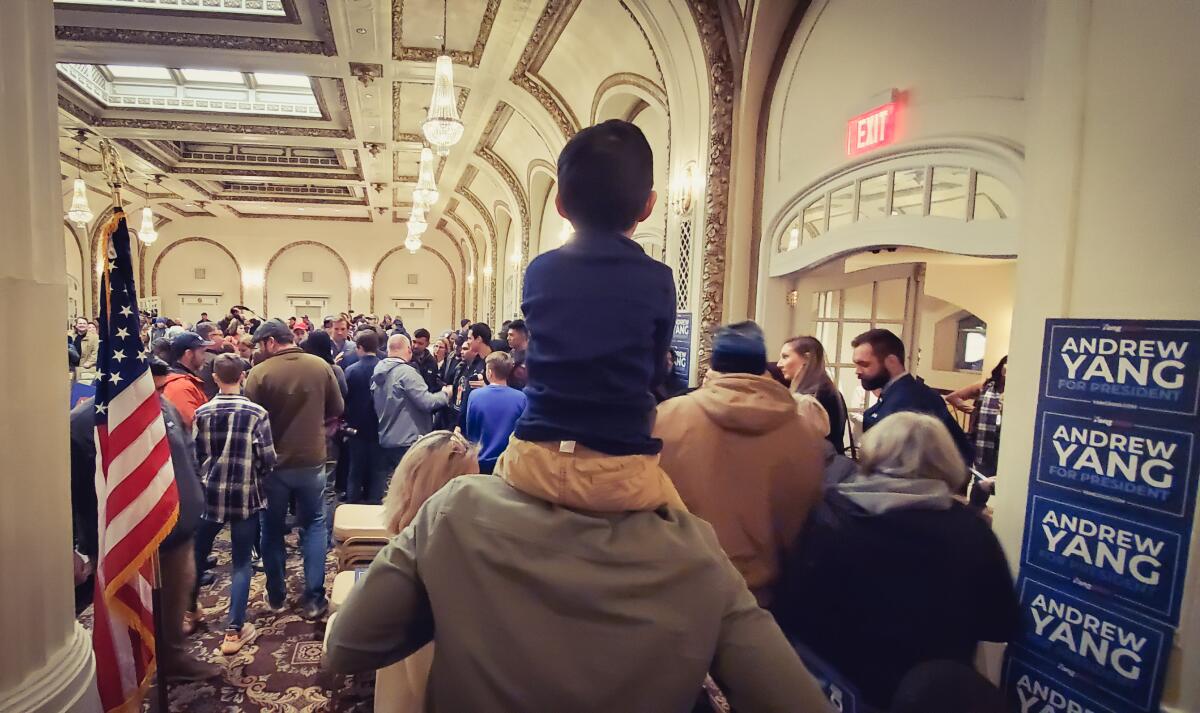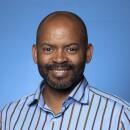The pressure’s on to woo Iowa voters, but Andrew Yang’s ‘having a blast’

CEDAR RAPIDS, Iowa — Just as Andrew Yang winds up to his closing pitch to an audience that’s packed a social hall in this city’s Czech Village neighborhood, a piece of metal hits the floor a few feet from where the Democratic presidential hopeful is standing.
“It’s the Russians,” Yang says without missing a beat. “They’re always trying to mess with my events.”
The audience, made up of about 80 Iowans and Yang campaign volunteers who traveled to the state from all over the country, bursts into laughter.
The typically laid-back New York entrepreneur and longshot candidate seemed especially carefree during town halls in the Eastern Iowa cities of Burlington and Davenport and here in Cedar Rapids this week, part of Yang’s 17-day bus tour across the state to woo Iowans before the first votes of the 2020 race are cast in this state’s Democratic caucuses.
As he signs autographs in Cedar Rapids, Yang frequently breaks out into a jogging motion as if warming up before a big game.
“I’m having a blast,” Yang says before leaving. “It’s like we’ve been in the regular season for months and now the playoffs are beginning.”
The political stakes couldn’t be higher for the presidential candidates, for whom success in Iowa would bring an aura of legitimacy and viability in a crowded field.
What you need to know about the Iowa caucuses, including their history, how they work and how influential they will be for Democratic voters picking their 2020 presidential nominee.
Despite languishing in national polls, Yang has shown staying power. And after failing to earn a spot on the stage at January’s Democratic debate, he was able to qualify for the one on Feb. 7.
The pressure doesn’t appear to faze Yang, though.
At each stop, he cracks intentionally lame jokes, gives high-fives to supporters, leisurely interrupts his own speeches to linger over sips of water, and on some occasions brings out his two young sons to join him, a move that made his promise to restore the American dream for the next generation seem personal.

Part political stand-up act, part economic soothsayer, Yang breezily treads a line that might give fits to candidates less at ease with a microphone. He simultaneously presents himself as an unflappable funnyman who’s the perfect antidote to our grave times, and a mathematics-driven “numbers guy” in a country that has more things wrong with it than voters can count.
He name-drops the late economist Milton Friedman as casually as he did the comedian Dave Chappelle, who endorsed Yang last month and campaigned with him in the state this week.
He uses his Asian American identity both as a punchline for his nerd jokes and a way to highlight the diversity of the country he wants to lead.
“Our country is sick, and I’m the right Asian doctor for the job,” he tells the Cedar Rapids audience.
Yang may not be a conventional politician, as he often reminds his audiences with a touch of pride, but the issues that supporters know him for — the decline of the middle class, the threat of automation to manufacturing jobs, rampant corruption in Washington — strike a chord in the humble river towns he visited.
He describes the loss of mom-and-pop retail by comparing Walmart to a tank that crushed small-town businesses in America’s town squares, and by comparing Amazon to “a spaceship hovering over your communities” from cyberspace, hastening the decline of brick-and-mortar shopping malls.
Even when sharing how he’ll revive America, Yang leaves room for banter to lighten the mood.
Speaking to an audience of 400 at a hotel ballroom in Davenport, Yang suddenly stops and looks around the room when a child in the audience makes a noise.
“I’m just making sure it’s not mine,” he says.
At Yang’s appearance in Davenport, Jennifer Starr, a 44-year-old stay-at-home mother of two, watches over her children. Yang’s economic message clicks with her, given that the family scrapes by on her husband’s income and government benefit checks, which they receive for having children with special needs.
Starr says Yang’s proposal to give every American $1,000 a month would help pull her family out of poverty.
“The system is designed to keep you down,” she says.
But it was Yang’s regular-guy demeanor, and his openness to discussing his own 7-year-old son’s autism, that impressed Starr the most. She plans to caucus for Yang on Monday.
Yang says his strategy is to remain firmly grounded in front of Iowa voters as the caucuses approach Monday, even while running in place in between shaking hands and signing autographs.
“We’re running a very human campaign and I think communicating as if you’re a human being — and not a robot giving a stump speech — is very welcome for everybody,” he says, “including me.”
More to Read
Get the L.A. Times Politics newsletter
Deeply reported insights into legislation, politics and policy from Sacramento, Washington and beyond. In your inbox three times per week.
You may occasionally receive promotional content from the Los Angeles Times.











